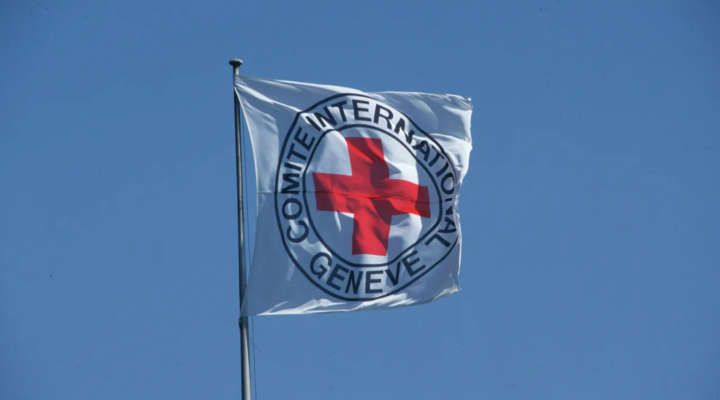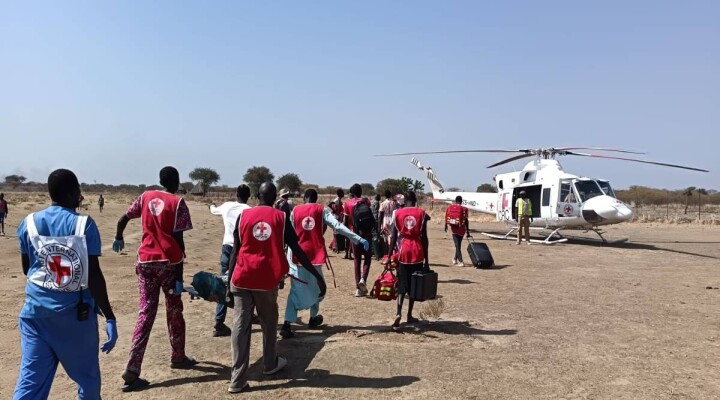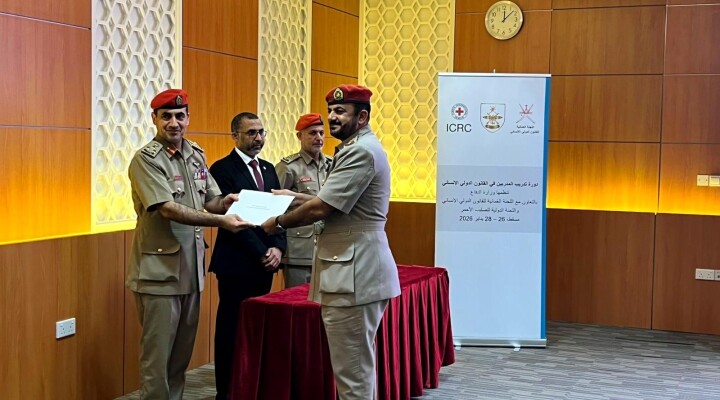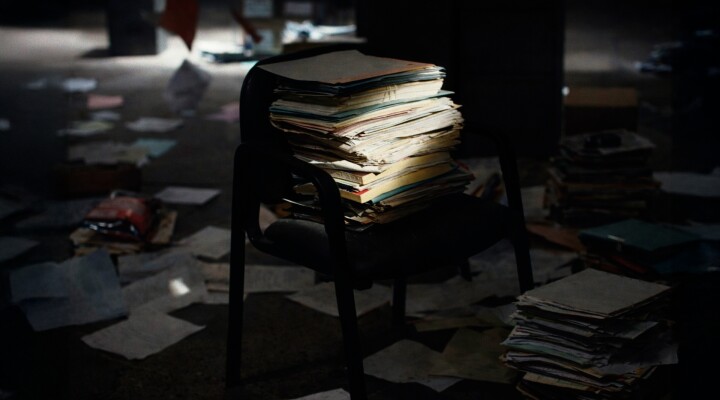Sudan: After a year of conflict, missing family bring extra heartache during Eid celebrations
A year of conflict in Sudan has caused increased humanitarian needs across the country and beyond its borders while causing millions suffering and pain. Access to healthcare, food, water and safety have been heavily disrupted, and the psychological consequences become more and more visible as the heartache that comes with a missing family member grows even stronger during Eid celebrations.
“My nephews, my aunts and more than 15 or 16 members of my family are missing, and we know nothing about them,” said Antasar Jouma Adam, who fled her home at the beginning of the conflict and found refuge in Port Sudan.
Staff of the International Committee of the Red Cross (ICRC) and volunteers from the Sudanese Red Crescent Society (SRCS) have played a crucial role in the humanitarian response over the past 12 months, even as many of them have experienced the same struggles and anguish. Among other things, they have helped hundreds of families reconnect with their missing relatives, supplied medical materials to hospitals located near or in conflict areas, and sent a surgical team to operate on people wounded by weapons.
Wajdan Hassan Ahmed, an SRCS nurse for over 15 years, recalls the terrible situation millions of people in Sudan have already been through. “The year of war was one of the most difficult years that I lived as a citizen and a volunteer in Sudan.” Among the many difficult moments were “the evacuations of people who were disfigured by bomb fragments, the stories of fathers who lost their daughters, mothers who lost their children, parents who lost all their family members,” she said.
For many families, the pain related to the loss of relatives and friends, or the absence of information about their missing loved ones, becomes especially difficult at a time when Muslims prepare for Eid celebrations. “A year ago, I prepared Ramadan arrangements and every day I broke the fast with a family member. The arrangements for Ramadan this year are just a stove and a pot,” said Antasar.
Over the past 12 months, in addition to providing assistance to communities affected by the conflict, and in line with its neutral intermediary role, the ICRC evacuated hundreds of orphans and their caretakers from Khartoum and facilitated the release of more than 500 persons detained in relation with the conflict
For further information please contact:
Fatima Sator, ICRC Geneva, Tel: +41 79 848 49 08, fsator@icrc.org
Adnan Hezam, ICRC Port Sudan, Tel: +249 100999477 +, ahizam@icrc.org
Follow the ICRC on facebook.com/icrc and twitter.com/icrc
LOGLIST
|
On-screen credit |
ICRC written or logo attached to story
|
|
Shooting date
|
18th March 2024
|
|
Country/Location
|
Om Alqura, Port Sudan, Sudan |
|
Language
|
Arabic/English |
|
Producer |
Adnan Hezam |
|
Cameraperson
|
Mohamed al Ibrahimi Ismaldeen |
|
Copyright / Details of restriction if applicable |
ICRC access all |
|
Length
|
07:54 |
|
LOCATION / IMAGE / TIMECODED TRANSCRIPT OF SOUNDBITES |
|
|
Tracking shot of Antasar walking through the displaced persons camp. |
|
|
00:12 - 00:18
|
Wide shot of the displaced persons camp with people sitting in the shade of one of the buildings.
|
|
00:18 - 00:33
|
Panning shot of the displaced persons camp.
|
|
|
Soundbite (Antasar Jouma Adam – Internally Displaced Person) |
|
00:33 - 00:42
|
“We used to live as a modest family with an average standard of living, and we thank God for everything.
|
|
00:42 - 00:50
|
But after the war the situation changed, and we lost our house and the security in which we lived,
|
|
00:50 - 01:01
|
in addition, the psychological factors for my children worsened due to the difficulty of adapting to this situation. |
|
01:01 - 01:11
|
A year ago, a month before Ramadan, I prepared Ramadan arrangements at home, |
|
01:11 - 01:20
|
and every day I broke the fast with a family member or broke the fast together outside the house. |
|
01:20 - 01:28
|
Now, the arrangements for Ramadan this year are just a stove and a pot |
|
01:28 - 01:36
|
and we prepare a meal to break our fast, and the next day we fast only on that meal. |
|
01:36 - 01:44
|
As for my husband, he is still missing and part of the family.
|
|
01:44 - 01:52
|
My nephews, my aunts and more than 15 or 16 members of my family are missing, and we know nothing about them. |
|
01:52 - 02:07
|
This is the most painful thing for me, and this pain increases whenever I remember the impact of losing them.
|
|
02:07 - 02:22
|
I hope that God will give us patience in this matter and that God will bring every family together with their missing relatives.”
|
|
02:22 - 02:48
|
A shot of Antasar inside the centre, taking and laying her baby on a bed under a mosquito net.
|
|
02:48 - 02:55
|
Close up of Antasar's son, Ahmed, with tears on his face.
|
|
02:55 - 03:01
|
Close up of a visible distressed Antasar.
|
|
03:01 - 03:06
|
Close up of Antasar's hands.
|
|
03:06 - 03:12
|
Antasar and her son speaking to an ICRC staff.
|
|
03:12 - 03:25
|
Shot of a woman inside the centre putting charcoal on a stove then places a pot on top. |
|
03:25 - 03:37
|
Panning shot of women sitting in a room at the centre.
|
|
03:37 - 03:42
|
A woman in the room speaking.
|
|
|
Soundbite (Wajdan Hassan Ahmed – Volunteer, Sudan Red Crescent Society) |
|
03:42 - 03:56
|
“The year of war was one of the most difficult years that I lived as a citizen and a volunteer in Sudan.
|
|
03:56 - 04:05
|
Despite all the circumstances in which I worked voluntarily, this year has not been the same for me, I hope to God that a year like this will not happen again.”
|
|
04:05 - 04:17
|
A shot of Wajdan picking her handbag and Red Crescent vest before leaving for work.
|
|
04:17 - 04:27
|
Shots of Wajdan leaving for work.
|
|
04:27 - 04:37
|
Shots of Wajdan at a team meeting at the Sudan Red Crescent Society offices in Port Sudan.
|
|
04:37 - 04:45
|
Close up shot of Wajdan packing a bag with first aid supplies.
|
|
04:45 - 04:50
|
Shot of a Red Crescent vehicle outside the offices.
|
|
04:50 - 05:03
|
Shot of Wajdan getting into the SRCS vehicle.
|
|
|
Soundbite (Wajdan Hassan Ahmed – Volunteer, Sudan Red Crescent Society)
|
|
05:03 - 05:22
|
“My colleagues and I worked in evacuation operations, psychological support, and movement with fixed and mobile clinics.
|
|
05:22 - 05:44
|
We worked to provide meals to the displaced people and we worked to reunite families who lost their children, children aged 10 or 7 and of different ages.
|
|
05:44 - 05:50
|
We were working hard to reunite families with each other.
|
|
05:50 - 06:06
|
The stories I lived through at the beginning of the warthe evacuations of people who were disfigured by bomb fragments, the stories of fathers who lost their daughters, |
|
06:06 - 06:19
|
mothers who lost their children, parents who lost all their family members. |
|
06:19 - 06:31
|
All of these stories have not left my memory and I cannot forget them no matter how hard I try.
|
|
06:31 - 06:41
|
Because I lived these painful stories with the displaced people during the war in displaced centers and shelters.
|
|
06:41 - 06:55
|
We sought to provide psychological support to them because we were feeling the deterioration of their psychological condition,
|
|
06:55 - 07:06
|
and we were in our mobile clinics checking the conditions of cases, especially those sitting under the trees due to the difficulty of movement of some to come to our fixed clinics.”
|
|
07:06 - 07:37
|
Various shots of Wajdan interacting with people at the camp.
|
|
07:37 – 07:54
|
Shots of Wajdan and other SRCS volunteers helping prepare some food at the camp.
|
END



